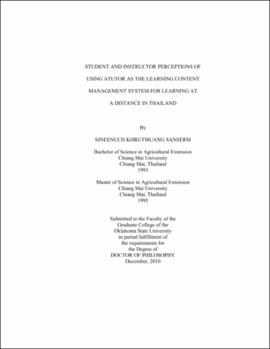| dc.contributor.advisor | Kelsey, Kathleen D. | |
| dc.contributor.author | Sanserm, Sineenuch Khrutmuang | |
| dc.date.accessioned | 2013-11-26T08:22:22Z | |
| dc.date.available | 2013-11-26T08:22:22Z | |
| dc.date.issued | 2010-12 | |
| dc.identifier.uri | https://hdl.handle.net/11244/6574 | |
| dc.description.abstract | Scope and Method of Study: The purpose of this study was to examine students' and instructors' perceptions of using ATutor as the learning content management system (LCMS) in e-learning courses at a distance university in Thailand. The population was composed of all 222 graduate students (census) and 10 instructors from an agricultural college at a major university in Thailand. Survey and focus group interview were used to collect data. Descriptive statistics and the Pearson Product Moment Correlation Coefficient were used to analyze data provided by respondents. | |
| dc.description.abstract | Findings and Conclusions: Gender, age, comfort of using computer and ATutor, time spent online, place and frequency accessing ATutor, internet access and connection had significant and positive correlation to students' perception of using ATutor. E-mail student, chat, forum, and group forum participated, ATutor satisfaction, online teaching experience, role in teaching, support from the university, and workshop attended had significant positive correlation to instructors' perception of using ATutor. The overall mean scores of students' perception of the usefulness, ease of use, interaction and communication, e-learning andragogical design, online learning, and self-directed learning ranged from 6.84 to 7.49 out of 10, and standard deviations ranged from 1.47 to 1.95. The overall mean scores of Instructors' perception of the usefulness, ease of use, interaction and communication, and teaching online by using ATutor ranged from 5.70 to 7.40 out of 10, and standard deviations ranged from 1.35 to 2.00. All six student perception variables and all four instructor perception variables had positive and significant correlation. The most important feature for students was content navigation and for instructors was announcement. Both students and instructors reported that poll was the least important feature. Most students and instructors indicated that no features should be added or removed from ATutor. ATutor supports self-directed learning because it enhances students ability to set an appropriate pace for learning and get assistance from various resources. In this context, ATutor detracted from self-directed learning due to course schedule and technological problems. Students and instructors encourage the university to adopt ATutor for all distance learning courses. | |
| dc.format | application/pdf | |
| dc.language | en_US | |
| dc.rights | Copyright is held by the author who has granted the Oklahoma State University Library the non-exclusive right to share this material in its institutional repository. Contact Digital Library Services at lib-dls@okstate.edu or 405-744-9161 for the permission policy on the use, reproduction or distribution of this material. | |
| dc.title | Student and instructor perceptions of using ATutor as the learning content management system for learning at a distance in Thailand | |
| dc.contributor.committeeMember | Weeks, Bill | |
| dc.contributor.committeeMember | Robinson, Shane | |
| dc.contributor.committeeMember | Curry, John | |
| osu.filename | Sanserm_okstate_0664D_11189.pdf | |
| osu.accesstype | Open Access | |
| dc.type.genre | Dissertation | |
| dc.type.material | Text | |
| dc.subject.keywords | adult education | |
| dc.subject.keywords | atutor | |
| dc.subject.keywords | distance learning | |
| dc.subject.keywords | e-learning | |
| dc.subject.keywords | online learning | |
| dc.subject.keywords | thailand | |
| thesis.degree.discipline | Agricultural Education | |
| thesis.degree.grantor | Oklahoma State University | |
